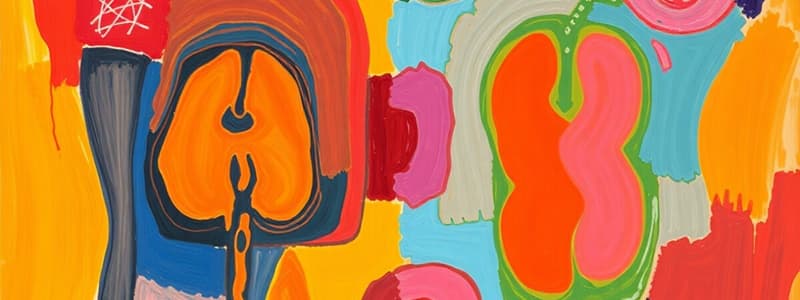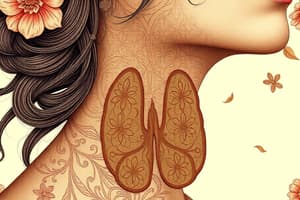Podcast
Questions and Answers
What is a primary management strategy for a patient experiencing a thyroid storm?
What is a primary management strategy for a patient experiencing a thyroid storm?
- Use of beta-blockers (correct)
- Administration of calcium supplements
- Immediate surgical intervention
- High-dose vitamin D therapy
Which of the following is a common clinical manifestation of hyperparathyroidism?
Which of the following is a common clinical manifestation of hyperparathyroidism?
- Muscle fatigue
- Increased appetite
- Hypocalcemia
- Elevated blood pressure (correct)
What is the most serious form of hypothyroidism?
What is the most serious form of hypothyroidism?
- Subclinical hypothyroidism
- Euthyroid sick syndrome
- Autoimmune thyroiditis
- Myxedema coma (correct)
What is a characteristic of hypoparathyroidism?
What is a characteristic of hypoparathyroidism?
Which factor is NOT associated with the development of hyperthyroidism?
Which factor is NOT associated with the development of hyperthyroidism?
What is an important nursing intervention for managing a patient with hyperthyroidism?
What is an important nursing intervention for managing a patient with hyperthyroidism?
In the context of hyperparathyroidism, what role does hydration therapy play?
In the context of hyperparathyroidism, what role does hydration therapy play?
Which medication is primarily used for managing hypothyroidism?
Which medication is primarily used for managing hypothyroidism?
Which sign is associated with hypoparathyroidism and indicates tetany?
Which sign is associated with hypoparathyroidism and indicates tetany?
What is a significant complication of thyroid hormone administration for patients with a history of cardiac dysfunction?
What is a significant complication of thyroid hormone administration for patients with a history of cardiac dysfunction?
What is a potential complication of hyperparathyroidism that requires immediate treatment?
What is a potential complication of hyperparathyroidism that requires immediate treatment?
At what age range is hypothyroidism most commonly diagnosed?
At what age range is hypothyroidism most commonly diagnosed?
What dietary restriction is recommended for patients with hypoparathyroidism?
What dietary restriction is recommended for patients with hypoparathyroidism?
What should patients avoid after receiving radioactive iodine therapy?
What should patients avoid after receiving radioactive iodine therapy?
Which hormone is primarily responsible for increasing cellular metabolism rate?
Which hormone is primarily responsible for increasing cellular metabolism rate?
What physiological role does parathyroid hormone (PTH) play in the body?
What physiological role does parathyroid hormone (PTH) play in the body?
What is the primary functional role of calcitonin?
What is the primary functional role of calcitonin?
Which gland controls the secretion of T3 and T4?
Which gland controls the secretion of T3 and T4?
What must be monitored closely when patients with hypothyroidism are taking analgesic or anesthetic agents?
What must be monitored closely when patients with hypothyroidism are taking analgesic or anesthetic agents?
How does hydrocortisone help in the management of thyroid storm?
How does hydrocortisone help in the management of thyroid storm?
What test is mainly used to assess thyroid function after radioactive iodine therapy?
What test is mainly used to assess thyroid function after radioactive iodine therapy?
What is the normal range for serum Thyroid-stimulating Hormone (TSH)?
What is the normal range for serum Thyroid-stimulating Hormone (TSH)?
Which of the following is NOT a direct assessment method for thyroid function?
Which of the following is NOT a direct assessment method for thyroid function?
What is the recommended initial approach if angina occurs during thyroid hormone treatment?
What is the recommended initial approach if angina occurs during thyroid hormone treatment?
Hypothyroidism is primarily characterized by what?
Hypothyroidism is primarily characterized by what?
Which test measures the capacity of the blood to bind T3?
Which test measures the capacity of the blood to bind T3?
What condition is characterized by excessive secretion of parathyroid hormone?
What condition is characterized by excessive secretion of parathyroid hormone?
Which hormone has a role in regulating calcium levels by increasing deposition in bones?
Which hormone has a role in regulating calcium levels by increasing deposition in bones?
In assessing thyroid disorders, what might a fine-needle aspiration biopsy be used to determine?
In assessing thyroid disorders, what might a fine-needle aspiration biopsy be used to determine?
Flashcards
Hypothyroidism cause
Hypothyroidism cause
Suboptimal levels of thyroid hormone
Thyroid hormones
Thyroid hormones
T3 and T4 produced by the thyroid gland
Calcitonin function
Calcitonin function
Reduces calcium levels in the blood
Thyroid gland location
Thyroid gland location
Signup and view all the flashcards
TSH source
TSH source
Signup and view all the flashcards
T3/T4 effect
T3/T4 effect
Signup and view all the flashcards
Thyroid function tests
Thyroid function tests
Signup and view all the flashcards
Hypothyroidism symptoms
Hypothyroidism symptoms
Signup and view all the flashcards
Hyperthyroidism definition
Hyperthyroidism definition
Signup and view all the flashcards
Normal TSH range
Normal TSH range
Signup and view all the flashcards
Hypothyroidism
Hypothyroidism
Signup and view all the flashcards
Hashimoto's Thyroiditis
Hashimoto's Thyroiditis
Signup and view all the flashcards
Myxedema Coma
Myxedema Coma
Signup and view all the flashcards
Levothyroxine
Levothyroxine
Signup and view all the flashcards
Hyperthyroidism
Hyperthyroidism
Signup and view all the flashcards
Graves' Disease
Graves' Disease
Signup and view all the flashcards
Exophthalmos
Exophthalmos
Signup and view all the flashcards
Radioactive Iodine Therapy
Radioactive Iodine Therapy
Signup and view all the flashcards
Antithyroid Medications
Antithyroid Medications
Signup and view all the flashcards
Thyroid Storm
Thyroid Storm
Signup and view all the flashcards
Thyroid Storm Management
Thyroid Storm Management
Signup and view all the flashcards
Hyperthyroidism Nutrition
Hyperthyroidism Nutrition
Signup and view all the flashcards
Hyperthyroidism Coping
Hyperthyroidism Coping
Signup and view all the flashcards
Hyperthyroidism Self-esteem
Hyperthyroidism Self-esteem
Signup and view all the flashcards
Parathyroid Function
Parathyroid Function
Signup and view all the flashcards
Hyperparathyroidism
Hyperparathyroidism
Signup and view all the flashcards
Hyperparathyroidism Symptoms
Hyperparathyroidism Symptoms
Signup and view all the flashcards
Hyperparathyroidism Management
Hyperparathyroidism Management
Signup and view all the flashcards
Hypoparathyroidism
Hypoparathyroidism
Signup and view all the flashcards
Study Notes
Endocrine Disorders: Hypothyroidism and Hyperthyroidism
- Hypothyroidism: Characterized by insufficient thyroid hormone. Affects women more frequently (5-8x) than men, usually between ages 40-70.
- Causes: Autoimmune disease (e.g., Hashimoto's thyroiditis), post-Graves disease, and treatment for hyperthyroidism.
- Clinical Manifestations: Mild to severe symptoms affecting all body functions. May include depression, lethargy, decreased consciousness, somnolence, hypoventilation and coma. Common signs include hyponatremia, hypoglycemia, hypoventilation, hypotension, bradycardia, and hypothermia. Myxedema coma is a severe, life-threatening form.
- Assessment: Serum TSH (0.4-6.15 µu/ml), serum free T4 (0.9-1.7 ng/dL), serum T3 (80-200 ng/dL), serum T4 (5.4-11.5µg/dL). Other tests include T3 Resin uptake, Radioactive Iodine Uptake, Thyroid Antibodies, Fine-needle aspiration biopsy, and Thyroid scan.
- Medical Management: Replaces missing thyroid hormone with synthetic levothyroxine. Carefully monitors for associated dysrhythmias and angina. Discontinue thyroid hormone if dysrhythmias or angina occur. Start at low dosages and monitor closely, and use caution when medications interact.
- Nursing Interventions: Careful monitoring of analgesic, sedative, and anesthetic agent effects. Educating patients on medication administration, side effects, follow-up importance, and dietary needs. Closely monitor patients with severe hypothyroidism/myxedema coma.
Endocrine Disorders: Hyperthyroidism
- Hyperthyroidism: Excessive thyroid hormone production (endogenous or exogenous). Affects women 8x more frequently, onset usually between 20s and 40s.
- Causes: Graves' disease (autoimmune disorder), toxic multinodular goiter, toxic adenoma, thyroiditis, and excessive thyroid hormone ingestion. Associated or preceded by events such as shock, stress, or infection.
- Clinical Manifestations: Enlarged, often soft, pulsating thyroid gland. Palpable thrill, and bruit heard over thyroid arteries. Symptoms include exophthalmos (bulging eyes).
- Assessment: Decreased serum TSH, increased free T4, increased radioactive iodine uptake.
- Medical Management: Varied treatment depending on cause: antithyroid agents, radioactive iodine (131I), or surgery (total or subtotal thyroidectomy). Radioactive iodine therapy destroys thyroid cells, and sometimes is preceded by antithyroid medications (e.g., methimazole)
- Side Effects of Treatment: Relapse or recurrent hyperthyroidism or permanent hypothyroidism,
- Thyroid Storm: A severe, life-threatening condition characterized by cardiac dysrhythmias, fever, and neurologic impairment. Management: hypothermia measures, hydrocortisone, acetaminophen, humidified oxygen, IV fluids.
- Nursing Management: Monitor patients for malnutrition (due to the increased metabolic rate and appetite increase). Support, and help patients with coping mechanisms.
Endocrine Disorders: Parathyroid Disorders
Hyperparathyroidism
- Hyperparathyroidism: Overproduction of parathyroid hormone (PTH) causing elevated serum calcium. 2-4 times more common in women than men, typically occurring between 60 and 70 years old.
- Causes: Overproduction of parathyroid hormone
- Clinical Manifestations: May be asymptomatic. Can include osteoporosis, hypercalcemia, hypertension & cardiac dysrhythmias, renal calculi, constipation, apathy, fatigue, depression, nausea, vomiting, peptic ulcers, pancreatitis, and skeletal pain.
- Assessment: Serum calcium levels, parathyroid hormone level, X-rays/bone scans, ultrasound, MRI, and fine-needle biopsy.
- Medical Management: Surgical removal of abnormal parathyroid tissue (parathyroidectomy). Minimally invasive techniques are increasingly common.
- Medical Management: hydration therapy (increased fluid intake). avoiding thiazide diuretics. mobility encouragement. appropriate diet and medication management.
- Nursing Management: Maintain calcium-phosphorus balance. Monitor for complications such as hypercalcemic crisis. Monitor patients undergoing parathyroidectomy and educating patients/families.
Hypoparathyroidism
- Hypoparathyroidism: Low production of PTH leading to hypocalcemia and hyperphosphatemia.
- Causes: Thyroidectomy, parathyroidectomy, autoimmune responses, vitamin D deficiency.
- Clinical Manifestations: Hypocalcemia symptoms (Tetany), muscle spasms, numbness and tingling, stiffness, bronchospasm, laryngeal spasm, carpopedal spasm, dysphagia and photophobia, cardiac dysrhythmias, seizures, anxiety and depression.
- Assessment: Positive Chvostek's and Trousseau's signs, serum calcium and phosphate levels, and X-rays showing increased bone density.
- Medical Management: Increasing serum calcium levels to 9-10 mg/dL, often with calcium supplementation (oral or IV). Vitamin D supplementation to enhance calcium absorption. Use of medications like aluminum hydroxide to bind phosphate and increase excretion.
- Nursing Management: Close monitoring of postoperative patients. Immediate availability of calcium gluconate for emergency use. Patient education about diet and medication to control hypocalcemia. ECG monitoring for cardiac patients.
Studying That Suits You
Use AI to generate personalized quizzes and flashcards to suit your learning preferences.



